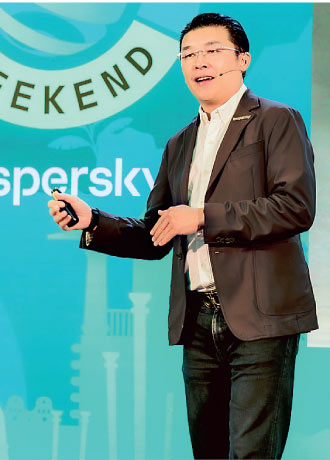Sunday Feb 15, 2026
Sunday Feb 15, 2026
Monday, 12 August 2024 00:10 - - {{hitsCtrl.values.hits}}

Panel discussion
 |
| Kaspersky Managing Director – APAC region Adrian Hia |
 |
| Kaspersky Director – Global Research and Analysis Team (GReAT) Igor Kuznetsov
|
Global cybersecurity provider Kaspersky held their annual Cybersecurity Weekend for Asia Pacific Countries 2024 from 4 - 7 August 2024 in Sri Lanka to give an overview of the latest cybersecurity developments and potential threat vectors in the region as well as best practices to address the latest security challenges. Ransomware remains a key threat with the proliferation of AI in offensive roles by threat actors potentially adding to complexity and sophistication in cyberattacks. The world’s foremost cybersecurity professionals, journalists, CTOS, executives from key industries and more were given insight and in-depth analysis of the most pressing cybersecurity threats as well as potential challenges with the proliferation of AI by leading Kaspersky cybersecurity experts.
The selection of Sri Lanka as the location of the Kaspersky 2024 Cybersecurity Weekend for Asia Pacific countries highlights the growing importance of the country and Kaspersky’s mission to offer comprehensive cybersecurity services to safeguard digital infrastructure for both public and private entities as well as individuals, small and medium businesses (SMBs), midrange and large enterprises and critical infrastructure companies alike.
At the conference, Kaspersky Managing Director – APAC region Adrian Hia highlighted how cybersecurity providers and the organisations that employ them need to adjust their cybersecurity posture and be aware of the legal ramifications of the regions they operate in. “For many organisations, the integration of AI is inevitable, with their invaluable ability to process large data sets but stakeholders need to be aware of data compliance especially when combined with the use of AI. Policies need to be implemented into how confidential data is treated and what aspects of that data are accessible by AI while remaining compliant to the laws and regulations that an organisation is beholden to in the area they are operating in,” said Adrian.
As Kaspersky Global Research and Analysis Team (GReAT) Director, Igor Kuznetsov has a bird’s eye view of the cybersecurity threat landscape. “The most common cybercrime being perpetrated globally is ransomware with threat actors running it like a business (RaaS), with the most common infection vectors being exploitation of vulnerable public facing applications, followed by compromised and brute-forced credentials. An emerging threat that should be accounted for is the compromise of supply chains and trusted relationships – half of such cases were noticed after the attack succeeded. In terms of targets, the most attacked industries were governmental entities, financial institutions and manufacturing companies,” said Igor.
Also highlighted at the summit was the growing role of AI in cybercrime that are able to enhance social engineering attacks by creating more natural sounding emails and input for phishing attacks, generate passwords, help to code malware and even perform password attacks. The advent of AI also means that cybercriminals can potentially target potential victims with adversarial attacks, by making small modifications to files so that AI systems could be manipulated to misclassify malware as safe files. To further enhance security and detection rates, Kaspersky imitates adversarial attacks on their own malware detection models.
Kaspersky also leverages AI to detect malicious attacks and emerging threats, especially seeing the number of potential malwares that occur with 411,000 unique malware samples detected daily in 2024 alone and over 403,000 daily in 2023.